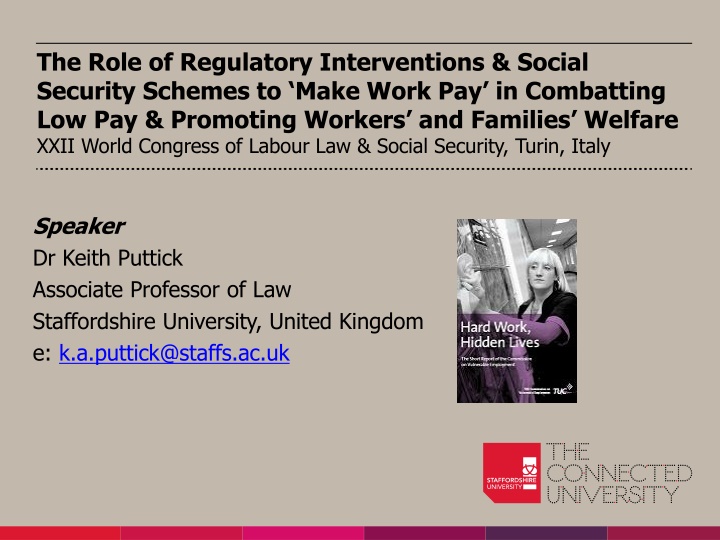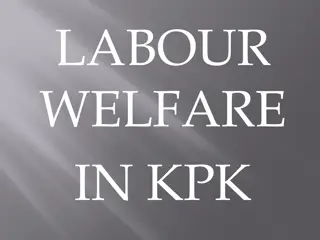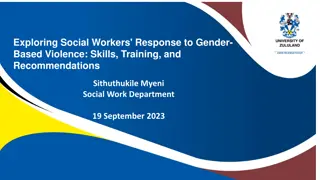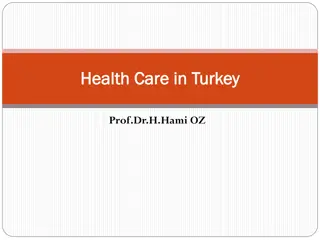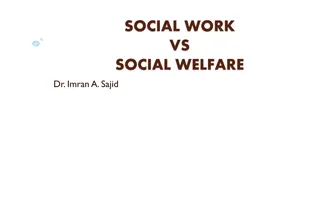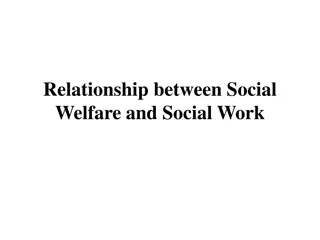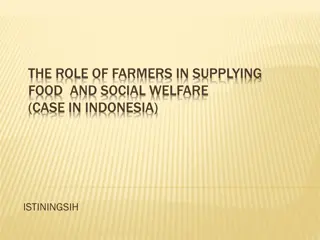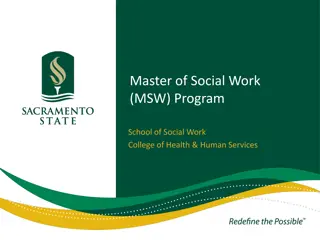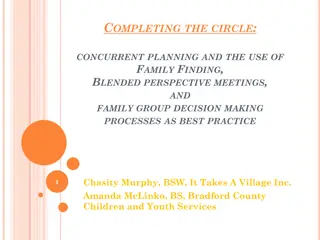Enhancing Workers' Welfare Through Regulatory Interventions & Social Security Schemes
This paper discusses the role of regulatory interventions and social security schemes in combating low pay and promoting workers' welfare. It highlights challenges in modern labour law and social protection, focusing on supporting low-paid workers and their families amidst evolving labour market trends.
Download Presentation

Please find below an Image/Link to download the presentation.
The content on the website is provided AS IS for your information and personal use only. It may not be sold, licensed, or shared on other websites without obtaining consent from the author.If you encounter any issues during the download, it is possible that the publisher has removed the file from their server.
You are allowed to download the files provided on this website for personal or commercial use, subject to the condition that they are used lawfully. All files are the property of their respective owners.
The content on the website is provided AS IS for your information and personal use only. It may not be sold, licensed, or shared on other websites without obtaining consent from the author.
E N D
Presentation Transcript
The Role of Regulatory Interventions & Social Security Schemes to Make Work Pay in Combatting Low Pay & Promoting Workers and Families Welfare XXII World Congress of Labour Law & Social Security, Turin, Italy Speaker Dr Keith Puttick Associate Professor of Law Staffordshire University, United Kingdom e: k.a.puttick@staffs.ac.uk http://www.vulnerableworkers.org.uk/wp-content/uploads/2008/05/report1.jpg
Thank You! My thanks to the organisers of the XXII World Congress for organising such an excellent event and for my invitation to speak. Many of the topics in the programme are very topical, and the debates have been very informative!
Introduction & Aims The Focus of this Paper The challenges for modern labour law and social protection floors (Bachelet, 2011) of supporting low-paid workers and their families, factoring in current challenges and labour market trends: Low pay: an increasingly common phenomenon, whether this is extreme or moderate working poverty on ILO definitions (ILO, 2018a). Traditional support: from the family or insurance-based systems (Barr, 2012), but now with a growing dependence on the State and non- insurance sources like make work pay schemes (MWPs). Challenges identified by the ILO Global Commission on the Future of Work (2018) such as gender inequalities, gig economy , insecure work transitions: issues which are developed later.
Challenges & Trends As these challenges and trends continue we see The continuing phenomena of under-employment possibly intensifying in some sectors as unskilled and semi- skilled work is displaced by Artificail Intelligence (AI) and new technologies informal and precarious work, dwindling real wages, etc leading to persistently high proportions of working poor (ILO, 2014: 6). We also see a continuing growth in part-time and self- employed work at below-subsistence earnings - but outside the scope of traditional State systems support.
Make Work Pay Schemes (MWPs) MWPs more common since 2000 Increasingly a feature (Adireksomba & Jinjarak, 2008) In a variety of forms: tax-based USA EITC, France s Revenu de Solidarit Active (RSA), UK s Universal Credit (UC), etc France s RSA and the UK s RSA are responsive to the needs of workers going in and out of short-term employment: as earnings rise, State support reduces and vice versa. But such schemes also need better support on the Labour side of the Labour-Social Security interface, eg action on gender discrimination, poor progression opportunities from employers, and better minimum wage floors and collective bargaining. Why? As the earnings floor rises the State s fiscal costs reduce. There are, however, limits to what may be expected from either side of the labour-social security interface.
Clouds on the Horizon National systems face other problems: Austerity and fiscal constraints on social security spending Newer challenges: precarious work in the gig economy (ILO, 2018) Regulatory interventions on which in-work social security systems must build are not working well, eg poor enforcement and employers do not pay above the minimum in many sectors - The UK minimum floor is often the ceiling:15% of labour market on NLW by 2020: some low-pay sectors like Accomodation it is 45%! - Limited training to assist progression to better pay: the UK has now legislated to force employees to seek better paid work as a condition of State support (Puttick, 2018) - Similarly, France with growing costs of the RSA (Guichard, 2016)
International Standards? ILO Global Commission on the Future of Work Much of the problem of in-work poverty maps, increasingly, on to the ILO s evolving Decent Work Agenda The rest of the paper examines this and the key challenges, internationally, including those identified by the ILO s The Global Commission on the Future of Work (ILO, 2018): Links between low pay and gender inequalities Work and earnings inequalities associated with the gig economy Reduced wages re. work transitions: maternity, paternity, illness, etc New technologies How should modern labour law and social security systems respond ? Let s now consider the ILO Commission on the Future of Work. Due to be concluded by 2019.
Gender Inequalities Gender Inequalities & Low Pay In the Commission s view the world of work is still deeply affected by pervasive gender inequality. The result ? Despite women s increasing labour market participation rates indeed in some countries in Europe, including the UK, they are now the majority of the workforce - women are still significantly disadvantaged in the labour market in terms of wages, conditions, and progression opportunities. In the UK context the progression problem blights wage and wider career progression opportunities (Costa Dias, 2016; Puttick, 2018; Puttick 2018a)
The Gig Economy Employment Rights & Social Security Coverage in the Gig Economy As the ILO has pointed out, whilst the revolution in social media has had a lot of positive effects, including the creation of new opportunities for entrepreneurial activities and employment opportunities through crowd-working, there are casualties. Not least is the considerable uncertainty on aspects of employment status, and low wages, as newer forms of flexible working and intermittent, unpredictable hours evolve, and difficulties are experienced by participants. This extends to a range of issues but even securing basic rights to payment, which in turn impacts on MWP systems ability to deliver support to groups like the self-employed .
Insecure Transitions The ILO Commission said As the world of work undergoes profound and extensive changes, the effectiveness of future labour market institutions will depend on how they facilitate the myriad transitions and cushion the risks that workers will experience throughout their working lives (ILO, 2018) Transitions have many possible causes (and risks), eg family changes, parenthood, illness, changing jobs (or balancing work/family responsibilities typically new carer or parental roles). Also, reductions in available work, so-called technological unemployment , and reorganizational redundancy . These impact on the wider community. So the State must ensure regulatory approaches and modern social security systems are fit for purpose; and that all stakeholders including employers - share a fair responsibility for low pay.
Conclusions Much needs to be done on both sides of the Labour-Social Security interface as larger numbers of workers particularly those in low paid and atypical work depend increasingly on the State as both a regulator and provider. The focus of making work pay schemes and regulation needs to shift to establishing an appropriate balance between the key stakeholders employers, labour market participants, etc - and the community that is funding collective insurance. Some of the newer directions being charted by the ILO s Global Commission are a space to be keenly watched! Thank you for your kind attention! Note: The full paper and references accompany these slides.
REFERENCES (FULL PAPER) Adireksombat, K. and Jinjarak, Y.(2008) The Adoption of In-Work Benefit Programs: An Exploration of International Experiences , Singapore: Nanyang Technical University, 2008. Alstott, A. (1995) The Earned Income Tax Credit and the Limitations of Tax-Based Welfare Reform, (1995) 108 Harvard Law Review 533. Alstott, A. (2010) Why the Earned Income Tax Credit Doesn t Make Work Pay , (2010) 73 Law and Contemporary Problems 285. Bachelet (2011) Social Protection Floor for a Fair and Inclusive Globalisation: Report of the Advisory Group Chaired by Michelle Bachelet, International Labour Organisation (ILO) and the WHO, Geneva: ILO, 2011. Bain Report (2014) More than a Minimum: The Resolution Foundation Review of the Future of the National Minimum Wage Final Report (London: Resolution Foundation) 2014. Barr, N. (2012) The Economics of the Welfare State (Oxford: Oxford University Press, 5thedn). Beland, D. and Hansen, R. (2000) Reforming the French Welfare State: Solidarity, Social Exclusion and the Three Crises of Citizenship , West European Politics Vol 23 No. 1 (January 2000) 47-64. Bourgeois, C. and Tavan, C. (2009) The Revenu de Solidarite Active or Earned Income Supplement: Its Design and Expected Outcomes, Paris: Tr sor-Economics No. 61, July 2009: Treasury and Economic Policy Directorate, R publique Fran aise. Broughton, N. and Richards, B. (2016) Tough Gig: Tackling Low Paid Self-Employment in London and the UK, Social Market Foundation, October 2016. Costa Dias, M. et al (2016) The Gender Wage Gap (London: Institute for Fiscal Studies, 2016).
REFERENCES (FULL PAPER) Cousins, M. (2014) In-Work Benefits: Effective Social Protection or Emperor s New Clothes ? (2014) European Journal of Social Security Vol. 16 Issue 2, 100-121. De Stefano, V. (2016) The Rise of the Just-in-Time Workforce : On-Demand Work, Crowd-Work and Labour Protection in the Gig-Economy in De Stefano (ed) Crowdsourcing, The Gig-Economy, and the Law, Comparative Labor Law and Policy Journal Vol.37(3) 471-505. Eurofound (2017) Atypical Work (Brussels: Eurofound/European Observatory of Working Life, November 2017). O Grady, F. (2013) Bring Back Wages Councils to Tackle Living Standards Crisis , TUC 8thMarch 2013. Guichard, G (2016) Departments Trapped by the Soaring RSA , Le Figaro Economie 24 March 2016 HM Treasury (2017) Spring Budget 2017, HM Treasury, March 2017 Hunt, A. and Samman, E. (2016) Women s Economic Empowerment: Navigating Enablers and Constraints, ODI Development Progress Research Report (London, Overseas Development Institute). Ewing, K. et al (eds) (2016), A Manifesto for Labour Law: Towards a Comprehensive Revision of Workers Rights (Liverpool: Institute of Employment Rights). Ewing, K. and Hendy, J. (2017) New Perspectives on Collective Labour Law: Trade Union Recognition and Collective Bargaining , ILJ (2017) 46(1), 23. ILO (2014/15) World Social Protection Report 2014-15, Geneva: International Labour Organisation. ILO (2015a) World Social Protection Report 2014/15 (Geneva: ILO, 2015).
REFERENCES (FULL PAPER) ILO (2015b) Transition from the Informal to the Formal Economy Recommendation, 2015 (No. 204). ILO (2017) World Social Protection Report 2017 19: Universal Social Protection to Achieve the Sustainable Development Goals (Geneva: ILO). ILO (2018) The Global Commission on the Future of Work (ILO, 2018). ILO (2018a) World Employment Social Outlook: Trends 2018 (Geneva: ILO). ILO (2018b) Empowering Women in the Informal Economy (Brief 4, Global Commission on the Future of Work). ILO Multilateral Framework (2005) ILO Multilateral Framework on Labour Migration: Adopted by the Tripartite Meeting of Experts on the ILO Multilateral Framework on Labour Migration (Geneva, 31 October - 2 November 2005). Low Pay Britain 2016 (London: Resolution Foundation, 2016). Nickerson, J. (2014). Crowd Work and Collective Learning , in Littlejohn, A. and Margaryan, A. (eds) Technology-Enhanced Professional Learning - Processes, Practices, and Tools, New York: Routledge. O Grady, F. Bring Back Wages Councils to Tackle Living Standards Crisis , Trade Union Congress, 8th March 2013. Pieters, J. (2015) Flexible Hours Most Important Employment Condition to Netherlands Workers , NL Times, 23rdNovember 2015. Pissarides, P. (2014) Social Europe in a Climate of Austerity , Speech at the Eurofound Conference, Athens, 23rdJune 2014, in Social Europe, London: On-Line https://www.socialeurope.eu/social- europe-austerity
REFERENCES (FULL PAPER) Puttick, K. (2012) States Social Security and Support for the Wage-Work Bargain: Reconstructing Europe s Floor of Social Protection , ISLSSL European Congress of Labour Law and Social Security, Dublin (Theme III Keynote Paper). Puttick, K. (2014) The Challenges for Labour Law and Social Security Systems at the Labour-Social Security Interface in Blanpain, R. Hendrickx, D., Du Toit, D. (eds), Labour Law and Social Progress: Holding the Line or Shifting the Boundaries? (2016) BCLR Vol 92. Puttick, K. (2018) From Maxi to Mini Jobs? Low Pay, Progression and the Duty to Work (Harder) , Industrial Law Journal, Vol 47(4), July 2018. Puttick (2018a) Welfare, Wages and Work Disintegration or Renewal? Institute of Employment Rights (forthcoming, July 2018). Resolution Foundation (2017) Low Pay Britain 2017 (London: Resolution Foundation) SASSA (2015) South African Social Security Agency s Annual Report 2013/14, Pretoria:, Department of Social Development Stiglitz, J. (2009) The Global Crisis, Social Protection and Jobs , Address to the International Labour Organisation 12thMarch 2009 on the Occasion of the Award of the ILO Decent Work Research Prize; International Labour Review, Vol. 148 (2009) No.1-2. Tessier, L. et al (2013) Social Protection Floors and Gender Equality: A Brief Overview , Extension of Social Security (ESS) Working Paper No. 37, Geneva: ILO.
REFERENCES (FULL PAPER) TUC (2017) The Gig is Up: Trade Unions Tackling Insecure Work (London: Trade Union Congress, June 2017). Working Time Directive (1993), Council Directive 93/104/EC concerning certain aspects of the organization of working time (OJ No. L307, 13.12.93, p.18). UK Commons Enquiry (2016) Select Committee on Work and Pensions Report of the In-Work Progression in Universal Credit Inquiry, HC 549, 11thMarch 2016 UN Convention (1990) UN Convention on the Protection of the Rights of All Migrant Workers and their Families 1990, Adopted by General Assembly Resolution 45/158 of 18thDecember 1990
Speaker Keith Puttick is an Associate Professor of Law at Staffordshire University. Research interests and publications are in the areas of Labour Law, Social Welfare, and Migration. Profile/Publications: http://www.staffs.ac.uk/staff/profiles/kap1.jsp Work in 2018/19 From Mini to Maxi Jobs? Low Pay, Progression and the Duty to Work (Harder) , Industrial Law Journal (July 2018) Vol 47(4): https://academic.oup.com/ilj/advance-article- abstract/doi/10.1093/indlaw/dwy006/5048223?redirectedFrom=fulltext Welfare, Wages & Work Disintegration or Renewal? (forthcoming).
